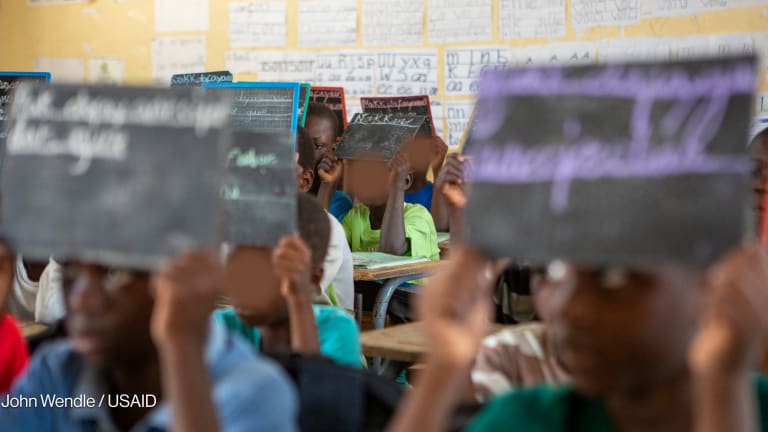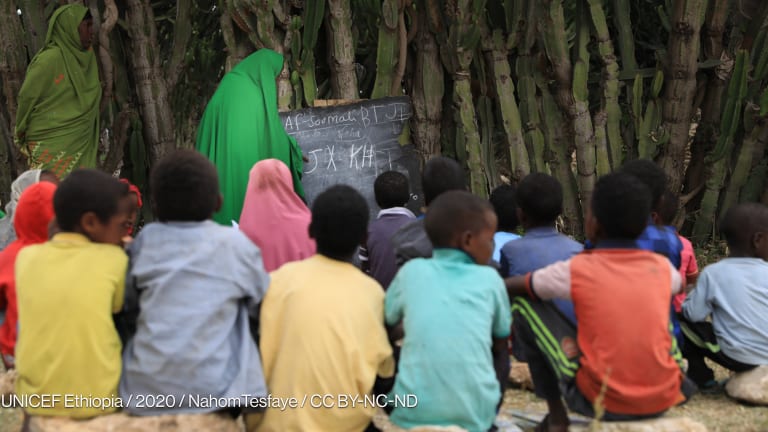PISA founder Andreas Schleicher on the future of the education ranking

DUBAI, United Arab Emirates — The global education ranking system, the Program for International Student Assessment, or PISA, is changing to put more emphasis on measuring 21st-century skills, such as creativity and digital literacy and to offer countries more analysis, PISA’s founder Andreas Schleicher said.
Schleicher, who is head of education at the Organisation for Economic Co-operation and Development, which runs PISA, said the ranking has already changed a great deal since it was first launched in 2000, but that it continues to evolve.
“Trigonometry was useful 400 years ago for measuring fields … We say it’s important without questioning it ... We should have a much closer look at what students learn today.”
— Andreas Schleicher, director, OECD Directorate of Education and Skills“As the world is changing, PISA evolves … we are less concerned about reflecting what schools currently do, we are more concerned with what kinds of cognitive, socioemotional skills do young people require to be successful tomorrow,” he told Devex during the recent Global Education & Skills Forum in Dubai, United Arab Emirates.
When PISA first started assessing groups of 15-year-olds from a sample of schools across different countries, its sole members were the world’s wealthiest nations, many of whom were initially reluctant to join, Schleicher said.
However, since then, PISA’s membership has expanded and now includes more than 40 non-OECD member countries. India recently rejoined after a 10 year absence.
OECD is also piloting PISA in lower-income countries, known as PISA for Development. “Five years ago, if you’d asked me if countries like El Salvador, Guatemala or Honduras or Paraguay would join [PISA] — [some of] these are countries torn by war and conflict — I would have said that I can’t imagine it, but they are all part of it now,” Schleicher said.
He puts the growing interest in PISA down to its ability to function as a “crowdsourcing platform for better education practices,” as opposed to its more established role as a comparison tool.
“The reason more and more countries are interested is to take part in this global conversation that PISA has created about what we should be teaching and how we can teach it best,” he said, adding that, “education solutions have no borders, they are not domestic in nature.”
PISA has seen more than just membership changes in recent years: The test has also grown to measure a broader set of skills and competencies beyond the standard literacy, numeracy, and science indicators.
The PISA test, which takes place every three years, now measures collaborative problem-solving and global competence, and in 2021, it will start measuring creative thinking, Schleicher said. The PISA team is also developing a way of testing students’ digital learning, which should be ready in time for the 2024 assessment, he added.
“You can become the slave of the algorithm that tells you what to do and think, but technology can also be a great enabler of human skills, and so we want to … look into the kind of cognitive … resources that help us leverage technology,” the PISA boss explained.
“At the moment, PISA tells us about the effectiveness of school systems, but I do believe it’s important to give schools a better source of feedback.”
— Andreas Schleicher, director, OECD Directorate of Education and SkillsThese shifts reflect the need for major reform within most education systems worldwide, which currently teach out-of-date information using old-fashioned methods such as rote memorization, Schleicher told Devex.
“Trigonometry was useful 400 years ago for measuring fields … It’s a relic of a long-gone past … We say it’s important without questioning it ... We should have a much closer look at what students learn today,” he said.
But education is a notoriously “conservative social enterprise,” he said, and school leaders, teachers, and parents can be resistant to change.
“When I talk to people working on curriculum design, it’s about protecting the status quo,” he said, adding that the opinions of students are what is really valuable: “The students of today have very good sense of what’s important for them and how they learn.”
However, while PISA is intended to measure and promote a competency-based approach to learning, this is not always communicated well and understood by politicians, according to João Costa, Portugal’s secretary of state for education. Speaking during a session at GESF, Costa said many countries still view PISA as a ranking and may “narrow” their curriculum in order to improve their scores.
“No one pays attention, politically thinking, to results in problem-solving…[or] student well-being and equity … there is more focus on ... maths, and literacy … but if we ignore data about equity, I think PISA is completely useless,” Costa said.
“Don’t take PISA as a rating agency but as a formative tool,” he added.
Schleicher also wants to “improve the analytical power” of PISA so that the data can be more useful to individual schools and teachers and students within them, Costa said, making it “more granular.”
“At the moment, PISA tells us about the effectiveness of school systems, but I do believe it’s important to give schools a better source of feedback,” he said.
The global PISA test samples a selection of schools to come up with a national score, but individual schools can also pay to take an individual PISA assessment. Schleicher said PISA for schools can help staff improve learning outcomes by providing evidence-based analysis of students’ performance and data on the challenges facing poor performers.
The scheme also offers peer-learning opportunities with other schools and teachers. Schleicher said he hopes to one day be able to offer this service for free.
Update, April 5, 2019: This article has been updated to clarify that João Costa, Portugal’s secretary of state for education, was the speaker at the GESF session.
Search for articles
Most Read
- 1
- 2
- 3
- 4
- 5








